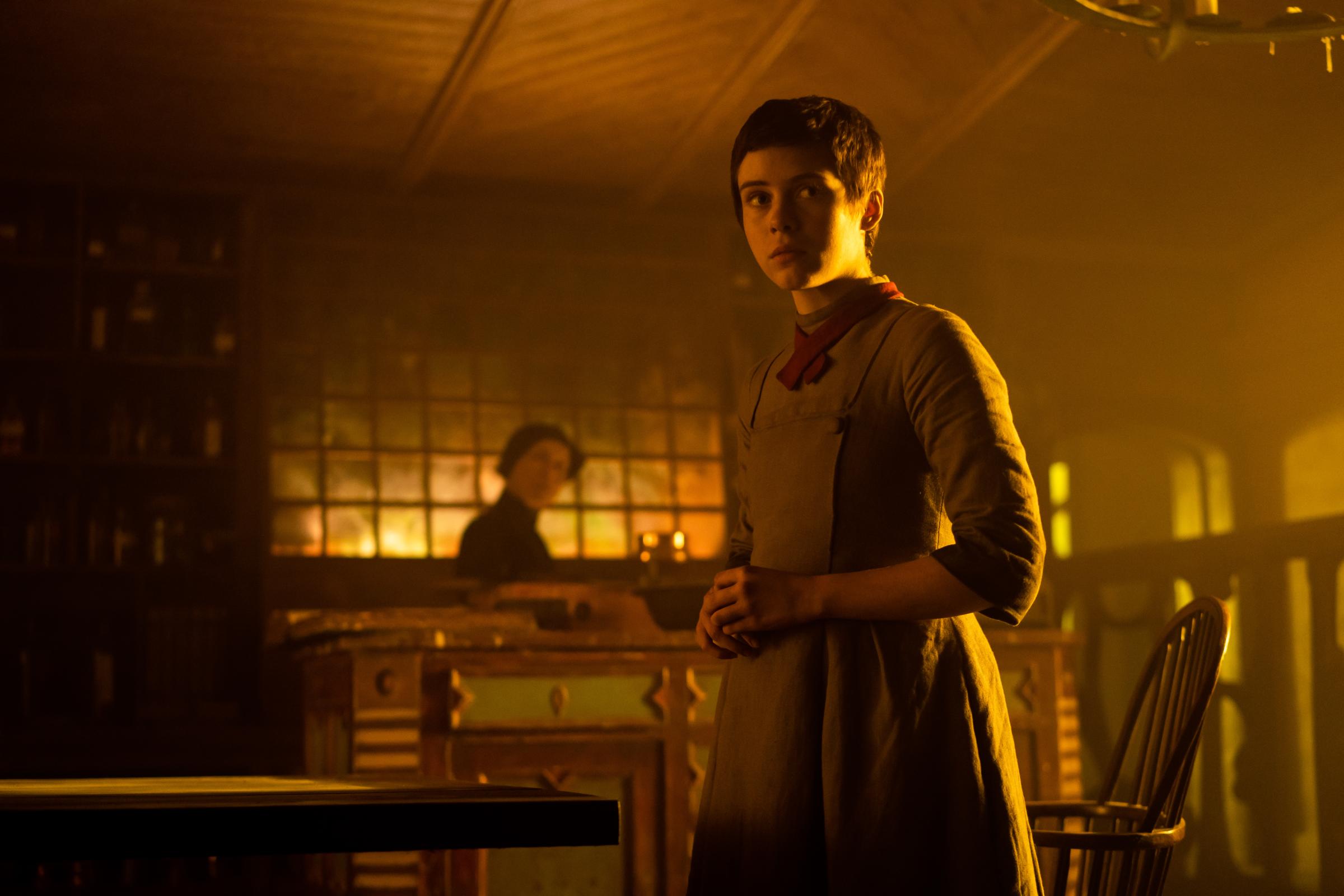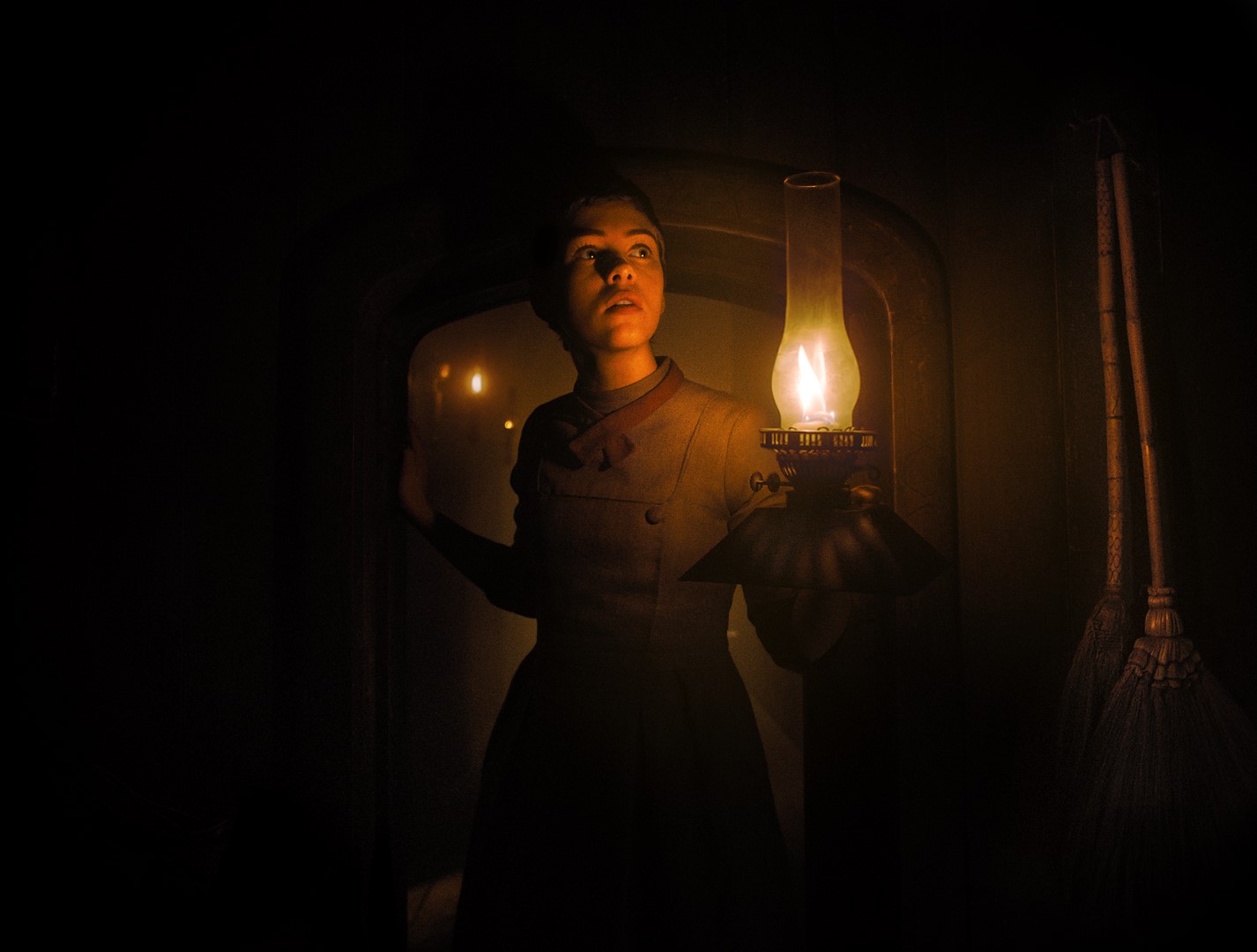Warning: This post contains spoilers for the movie Gretel & Hansel.
The story of “Hansel and Gretel” has been frightening children since the early 1800s, but Gretel & Hansel, director Osgood Perkins’ latest horror flick, pushes the fairy tale into new realms of terror.
Now, that’s not to say that the Brothers Grimm original, in which a young brother and sister are abandoned by their parents in a dark wood before stumbling into the clutches of a cannibalistic witch, has ever been particularly kid-friendly. But Perkins’ iteration fleshes out the characters with disturbing new layers. Instead of just leaving Gretel (played by IT and IT Chapter Two star Sophia Lillis) and Hansel (Sammy Leakey) in the woods, their mother threatens to chop them up with an ax if they don’t get out of the house. Instead of just a child-eating witch, Holda (Alice Krige) is a child-eating witch who feeds her current guests the remains of her previous victims (after using magic to disguise them as food, of course).
But it’s not these fresh horrific details that enable Gretel & Hansel to truly stand out from its source material. It’s the feminist spin that Perkins puts on the story.
As the title’s name reversal suggests, in this version, it’s a 16-year-old Gretel who takes the lead and is tasked with watching over her 8-year-old brother Hansel when they’re cast out on their own. It’s also Gretel, who is revealed to possess a sort of second sight, who Holda sees potential in once the siblings find their way to her home (which is made of more traditional materials than gingerbread this time around).

In the original story, the witch uses Gretel as a pawn after locking Hansel, her protector, in a cage. Gretel cries and laments her fate throughout, only taking action to stop the witch in a moment of desperation. Lillis’ Gretel is a different character altogether, one who maintains her agency even after Holda begins exerting her influence.
While Hansel is taken in by Holda’s friendly act from the start, Gretel suspects that something isn’t right about their host from the first moment they arrive. But that doesn’t stop her from allowing Holda to teach her some of her witchy ways. As their lessons progress, Holda becomes more and more intent on convincing Gretel that Hansel is “poison” to her and will always hold her back from reaching her full potential.
“What’s compelling to me is the devouring mother dynamic,” Perkins told Yahoo! News of Holda and Gretel’s relationship. “The idea of a mother who is equally creative and destructive. That’s something that Alice and I really wanted to make sure existed at all times: the witch really loves and respects Gretel as much as she wants to destroy her.”
As her powers blossom and Holda sinks her claws in further, Gretel grows increasingly resentful of her brother. But after learning the horrifying truth of Holda’s backstory and taste for children, she’s able to pull herself back from the brink of evil in time to kill the witch and rescue Hansel all in one magic-fueled swoop.

In the end, Gretel decides that it’s still best for her and Hansel to go their separate ways and sends him on to the convent that Charles Babalola’s unnamed huntsman directed them toward at the beginning of their journey. Determined to use her newly mastered powers for light rather than darkness, Gretel remains at the house in the woods and frees the souls of the children who have long been trapped there.
Gretel’s future is left open-ended and in her own hands, which is a far cry from where she ends up in the original story, back at home with Hansel and the father who abandoned her. However, while some critics are satisfied with Perkins’ feminist narrative, others have found the movie’s substance less satisfying than its bewitching visuals.
“[Gretel & Hansel] has some genuinely promising ideas in mind, at times prodding around the edges of a full-on feminist re-imagining of the fairy tale witch,” Andrew Barker wrote for Variety. “But it never manages to reconcile its deeper interests with the need to hit some of the more obvious genre paces.”
Still, Perkins’ movie is at least a reimagined coming-of-age story for Gretel, one in which she finds a way to take control of her own destiny despite the bad hand she’s been dealt.
More Must-Reads from TIME
- Donald Trump Is TIME's 2024 Person of the Year
- Why We Chose Trump as Person of the Year
- Is Intermittent Fasting Good or Bad for You?
- The 100 Must-Read Books of 2024
- The 20 Best Christmas TV Episodes
- Column: If Optimism Feels Ridiculous Now, Try Hope
- The Future of Climate Action Is Trade Policy
- Merle Bombardieri Is Helping People Make the Baby Decision
Write to Megan McCluskey at megan.mccluskey@time.com